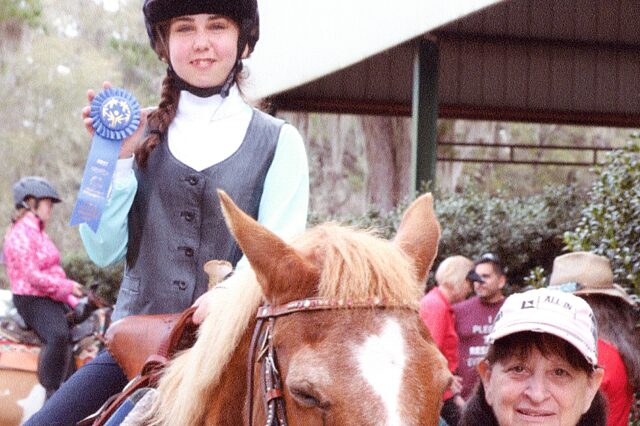Lungs for Lexi

Not many teenagers can say they placed first in equestrians at the Special Olympics. Few teenagers can say they had a double-lung transplant, too. Alexia "Lexi" McCue, 13, accomplished both.
Lexi was born on Nov. 1, 2004 with cystic fibrosis, or CF, a life-threatening lung disorder. Her condition worsened as she aged and, at age 7, Lexi was hospitalized in South Florida.
Enter Mary McCue, 74, a medical foster parent of 16 years. After 11 years of working as a pediatric rehabilitation nurse, Mary, a mother of six, had decided she wanted to help medically fostered children. She and her late husband, Bill, had dreamed of starting a medical foster care program. Mary completed the Model Approach to Partnerships in Parentings in addition to a separate training program for working with medical foster children.
One day, Mary received a phone call from the hospital about a child who needed to be placed in a medical foster care home. "They [the hospital] said, 'You've got to come meet Lexi,' and the next day I went down and got her," Mary said.
When Mary first met Lexi, the girl weighed only 30 pounds, had a feeding tube and wore toddler-sized clothing. Mary and Bill took in Lexi without hesitation, and started her on oxygen the first night in their care.
Growing up with the couple in Coral Springs, Florida, Lexi went to school for first through third grade while carrying around her oxygen tank. In time, Lexi's body weakened and she was taken out of school and enrolled in hospital/homebound education.
Mary continued to transport Lexi to appointments close to home and would bring Lexi back-and-forth from South Florida to UF Health in Gainesville to see a lung transplant specialist. Initially, Pamela Schuler, MD, the former medical director for UF Health's cystic fibrosis program and pediatric lung transplant program, would see Lexi for many years. After Schuler's departure, Lexi would be under the close eye of Michael Tsifansky, M.D., a pediatric pulmonologist and medical director for the UF Health Pediatric Lung Transplant program. The family had no other option in Florida but UF Health to seek a transplant.
In 2015, Lexi's breathing had become so shallow that simple tasks like walking felt impossible. She had to be placed on the lung transplant waitlist. Mary and Lexi uprooted from Coral Springs and moved to transplant housing in Gainesville where they would wait for a call that her new lungs had arrived.
Five times, Mary and Lexi received a call, but none of the lungs were a perfect match.
"Each time, we'd be at the hospital for 12 or 13 hours, but they'd say, 'Not for Lexi.' They wanted to find the perfect match," Mary said. "Lexi was extremely positive. She knew what was going to happen."
The sixth time was a charm. On March 10, 2016 at midnight, Lexi was taken to surgery by Tiago Machuca, M.D., Ph.D., a thoracic surgeon and surgical director of the UF Health Pediatric Lung Transplant Program, and Mark Bleiweis, M.D., the director of the UF Health Congenital Heart Center and chief of congenital cardiothoracic surgery at the UF Health Congenital Heart Center. The surgery was a success.
At 6 a.m., Mary was called to the pediatric cardiac intensive care unit, or PCICU, to see Lexi. Nearly 15 clinicians filled Lexi's room.
"They said, 'Now she needs you, go talk to her'," Mary said.
Five hours after her surgery, Lexi had the strength to be extubated, the process of removing a tube from the trachea, a procedure that typically takes two days. By the following day, Tsifansky had her walking on the treadmill. Lexi's recovery in the PCICU lasted less than two weeks.
Since her transplant, Lexi and Mary relocated to Williston, Florida where they live with their two cats, Cleopatra and Chloe, and their black-and-white dog, Lola. On July 26, 2016, Mary formally adopted Lexi as her daughter.
"The first time I saw her run, I was in tears," Mary said. "She was chugging along and grabbing her tank before. She was on oxygen 24/7."
Lexi has also developed a talent for horseback riding. In September 2017, a cashier at their local Winn-Dixie grocery store introduced Lexi to the idea. Since then, Lexi has been training at Tomorrow's Equestrian Center, a therapeutic riding program designed for children and adults with disabilities in North Central Florida.
"She goes up to the horses and talks to them," Mary said.
On Feb. 10, Lexi competed in her first regional equestrian Special Olympics. She received two blue ribbons and first place in equitation and trailing categories. Now, she trains for the Florida Special Olympics, which will take place at Lake Mary at the end of March.
When she's not riding, Lexi teaches herself guitar on her iPad and listens to some of her favorite music, including Green Day and My Chemical Romance.
The life of a transplant patient often includes another new organ during their lifetime. Until then, Lexi will continue to take daily rejection medicines, walk on the treadmill and see a pulmonologist to monitor her condition. All of this is in addition to mastering her next equestrian trick: jumping.
About the author
